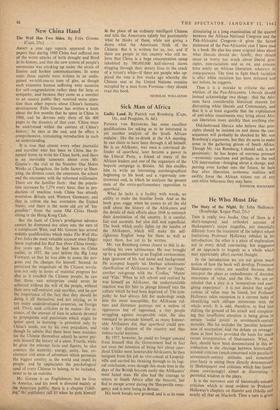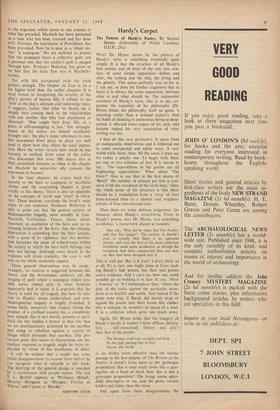He Who Must Die
The Story of the Night, By John Holloway. (Routledge, Kegan Paul, 21s.)
MIS is really two books. One of them is a short-tempered and orthodox account of Shakespeare's major tragedies, not essentially different from the treatment of the subject whose limitations Professor Holloway rebukes in his introduction; the other is a piece of exploration. not in every detail convincing, but suggestive of an approach to tragedy as a whole which may appreciably affect current thought.
In the introduction we are not given much notion of how the book will develop. Prominent Shakespeare critics are assailed because they interpret the plays as embodiments of doctrine, statements of value, and the like. We are re- minded that a play is a 'momentous and ener- gising experience': it is not denied that impli- cations of value may be found, but Professor Holloway takes exception to a current habit of identifying such oblique statements with the whole work. It is odd, therefore, to find him shifting the ground of his attack and complain- ing that insufficient attention is being given to certain 'nodal points' in seventeenth-century morality. His list includes the 'peculiar heinous- ness of usurpation' find the debate on revenge: these at least have provided the basis for much recent interpretation of Shakespeare. What, in fact, should have been demonstrated in this in- troduction is the cleavage between historically- minded criticism (much concerned with peculiarly seventeenth-century attitudes and sometimes over-hasty in seeing them directly demonstrated in Shakespeare) and criticism which has (some- times convincingly) aimed at discovering a perennial,wisdom in the plays.
It is the narrower sort of historically-minded criticism which is most evident in Professor Holloway's chapters on Hamlet and Othello and nearly all that on Macbeth. Then a turn is given to the argument which seems to run counter to what has preceded. Macbeth has been presented as a man who has been cozened and has done evil: Fortune, the instrument of Providence, has been provoked. Now he is seen as a `ritual vic- tim,' `a scapegoat.' We are inclined to protest that the scapegoat bears a collective guilt, not a personal one, that the society's guilt is purged through him: Professor Holloway has given us no hint that the basic flaw was in Macbeth's society.
Yet with this unexpected twist the book gathers strength. The chapter on Lear is on a far higher level than the earlier chapters. It is most honest in recognising the severity of the play's picture of human life; it refuses to see 'love' as the play's ultimate and redeeming value; it suggests, rather, that what we finally, see is simply men 'Coming back to the relationships with one another that they had abandoned or distorted: 'Men tangle their lives; life, at a price, is self-untangling at last.' The entangle- ments of the action are indeed excellently brought out: the play's many references to rest- less movement from place to place are well used to show how they affect the total impres- sion. Here the writer reveals how much he has learned, in method, from some of the critics who discontent him most. (He shares also in their occasional excesses, as when in the chapter on Macbeth he somewhat idly amasses the references to horses.) In the later chapters he comes back fre- quently to the hero as scapegoat or sacrificial victim, and the concluding chapter is given wholly to this theme. There is also an appendix on the concepts of 'myth' and 'ritual' in litera- ture. These sections constitute the book's main claim to our attention. Professor Holloway is able to point out that the general pattern of Shakespearian tragedy, most notably in Lear, Macbeth, Coriolanus, Tinton, shows simul- taneously an exaltation of the hero and an in- creasing isolation of the hero; that the ultimate destruction is something that the hero accepts. with a sense of its rightness; that this destruc- tion increases the sense of cohesiveness within the society to which the hero both belongs and does not belong. Although sonic details in the evidence will strain credulity, the case is well and on the whole cautiously argued.
Three general observations may be made: strangely, no relation is suggested between this theory and the Aristotelian catharsis, yet the purging of guilt which a scapegoat makes pos- sible seems indeed akin to what Aristotle apparently had in mind; it is arguable that the theory is valid for all tragedy, but here its rela- tion to Hamlet seems undervalued and non- Shakespearian tragedy is largely excluded; it seems likely, moreover, that tragedy (being the product of a civilised society) has a complexity here missed, that it not merely presents e sacri- ficial rite but implies a horror at that rite, that we are simultaneously quietened by the sacrifice and stung to rebellion against a system of things which demands" that sacrifice. The pre- carious poise that seems to characterise our im- mediate response to tragedy might be more ex- plicable by virtue of this doubleness of effect.
It will be evident that a reader has some initial disappointment to recover from before he can recognise what is valuable in this book. The blurring of the general design is matched by a carelessness with proper names. The late S. L. Bethell appears as Professor Bithell,' Maurice Morgann as 'Morgan,' Flavius as 'Flavus' and Cyprus as 'Rhodes.'
CLIFFORD LEECH































 Previous page
Previous page